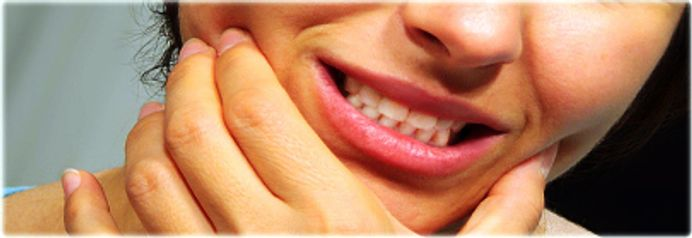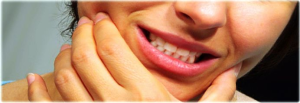MIHO's Healthy Smile Life
from webWD

クイズ: 顎の痛みについてどのくらい知っていますか?
Quiz: How Much Do You Know About Jaw Pain?
https://www.webmd.com/oral-health/rm-quiz-know-jaw-pain

Chewing gum can help relieve jaw pain.
True or False
Answer: False
Chewing gum doesn’t make jaw pain better. It actually can hurt your jaw joint because when you chew, you tense your jaw muscles. Avoid chewing on ice or hard foods and eat softer foods instead if you have jaw pain. If you grind your teeth at night, check with your health care provider about a device called a bite block to stop grinding.
url
チューインガムを噛むことで顎の痛みが緩和される
嘘か本当か
正解:嘘
チューインガムで顎の痛みは改善されません。 噛むことで顎の筋肉が緊張するため、実際には顎関節を傷つける可能性があります。 顎の痛みがある場合は、氷や固い食べ物を噛むのを避け、代わりに柔らかい食べ物を食べてください。 夜間の歯ぎしりがある場合は、歯ぎしりを止めるためのバイトブロックと呼ばれる装置について医療提供者にご相談下さい。

Jaw pain often comes from:
・the temporomandibular joint
・Jaw muscles
・facial nerves
・All the above
Answer: All of the above
Problems with the jaw joints, muscles, or nerves can all cause pain. Long-lasting jaw pain may indicate a temporomandibular joint disorder, or TMD. TMD pain can affect either or both sides of the face. The temporomandibular joint is made up of bones, muscles, ligaments, and discs. It’s a complex system that lets us talk, chew, and even yawn. If any part of the system isn’t working right, you can feel pain.
url
顎の痛みが発生する場所
・顎関節
・顎の筋肉
・顔面神経
・上記のすべて
正解:上記のすべて
顎の関節、筋肉、または神経の問題はすべて痛みを引き起こす可能性があります。 長期にわたる顎の痛みは、顎関節症(TMD)の可能性があります。 TMDの痛みは、顔の片側または両側に影響を与える可能性があります。 顎関節は、骨、筋肉、靭帯、および関節円盤で構成されています。 その複雑なシステムのおかげで、我々は話す、噛む、あくびをすることができます。 システムのいずれかの部分が正しく機能していない場合、痛みを感じる可能性があります。

A sign of TMD may be:
・Jaw pain
・Painful clicking or popping
・Jaw locking
・All the above
Answer: All of the above
Pain is the most common symptom of TMD, but you also may have painful clicking, popping, or grating when closing or opening your mouth. Sometimes the jaw may get stuck open or closed, or you may not be able to open your mouth very wide. Other symptoms may include headaches, jaw muscle stiffness, face swelling, and neck pain.
url
TMDの兆候とは
・顎の痛み
・痛みを伴うカクッという音、または弾けるような音
・ジョーロック(顎が固まって動かない)
・上記のすべて
正解:上記のすべて
痛みはTMDの最も一般的な症状ですが、口の開閉時に、カクッという音や、弾けるような音、もしくはきしむ音がすることもあります。 顎を開けたり閉じたりして動かなくなったり、口を大きく開けられなくなったりすることがあります。 その他の症状には、頭痛、顎の筋肉のこわばり、顔の腫れ、首の痛みなどがあります。

What is the main cause of TMD?
・Jaw or joint injury
・Arthritis
・Stress
・There isn't one
Answer: There isn’t one
For most TMD problems, there is no clear cause. It may be related to an injury to the jaw, or to rheumatoid arthritis or osteoarthritis in the jaw joint. Stress and teeth grinding also may affect jaw pain; however, the exact role of stress is still unclear.
url
TMDの主な原因とは?
・あごや関節の怪我
・関節炎
・ストレス
・上記のどれでもない
正解: 上記のどれでもない
ほとんどのTMDの問題には明確な原因がありません。 それは、顎の損傷、または顎関節の関節リウマチまたは変形性関節症に関連している可能性があります。 ストレスや歯ぎしりも顎の痛みに影響を与える可能性があります。 ただし、ストレスが及ぼす影響についてはまだ不明です。

Who is more likely to get TMD?
Men or Women
Answer: Women
More than 10 million Americans may have TMD, including about four times as many women as men. Researchers are trying to find out if there’s a connection between TMD and female hormones. Most likely to get TMD? Young women between 20 and 40.
url
誰がTMDになりやすいか?
男性か女性か
正解: 女性
女性の患者は男性より約4倍多いです。1000万人以上のアメリカ人がTMDを患っている可能性があります。 研究者たちは、TMDと女性ホルモンの間に関連性があるかどうかを調査してています。 TMDを患う可能性が最も高いのは? 20〜40歳の若い女性です。

Most people need surgery to treat TMD.
True or False
Answer: False
Surgery is usually a last resort. First, your health care provider may suggest using moist heat or cold packs, stress reduction, and a mouth guard to keep you from grinding your teeth. If those don‘t help, they may prescribe muscle relaxants or pain medications. In addition to the therapies mentioned, many dentists are using photobiomodulationfor the reduction of pain and inflammation associated with TMD. This is a form of low-level light therapy using lasers and LED lights. If there’s still no relief, options may include injections or surgery. Surgery could mean arthroscopy (using an instrument with a tiny camera to look at the joint and remove tissue or realign the joint) or full, open-joint surgery.
url
ほとんどの場合TMDの治療は手術が必要である?
嘘か本当か
正解:嘘
手術は通常最終手段です。 まず、医療提供者は、温湿布または冷湿布、ストレス軽減、および歯ぎしり防止用にマウスガードを提案することが多いようです。 効果が現れない場合、彼らは筋弛緩薬または鎮痛薬を処方するかもしれません。 それらに加えて、多くの歯科医は、TMDに関連する痛みと炎症の軽減のためにフォトバイオモジュレーションを使用します。 これは、レーザーとLEDライトを使用した低レベル光線療法の一形態です。 それでも緩和が見られない場合は、注射や手術などの選択肢があります。 手術とは、関節鏡内視鏡手術(小さなカメラを備えた器具を使用して関節を観察し、組織を除去するか、関節を再調整する)または完全な開放関節手術のことです。

You should never try to ease the symptoms of TMD by yourself.
True or False
Answer: False
In many cases, you can ease jaw pain simply by resting the jaw joint. Try switching to a softer diet — like yogurt, mashed potatoes, soup, and scrambled eggs — and avoid hard foods and chewing gum. You can control grinding or clenching by sticking your tongue between your teeth. For pain, try over-the-counter pain relievers. But even if you can do some things to feel better, treating a condition with an unknown origin can be harmful. With jaw pain such as with TMD, it’s always important to see a health care practitioner to verify the condition and to call your health care provider if your symptoms don’t get better.
url
自分でTMDの症状を緩和させるべきではない
嘘か本当か
正解:嘘
多くの場合、顎関節を休めるだけで顎の痛みが緩和されます。 ヨーグルト、マッシュポテト、スープ、スクランブルエッグなどのより柔らかい食事に切り替えてみてください。硬い食べ物やチューインガムは避けてください。 舌を歯の間に挟むことで、歯ぎしりや食いしばりをコントロールできます。 痛みについては、市販の鎮痛剤を試してください。 しかし、痛みを緩和するために何かできたとしても、原因が不明な状態を勝手に治療すること有害な場合があります。 TMDのような顎の痛みがある場合は、状態を確認し、症状が改善しない場合には医療機関にかかるか、医療従事者に相談することが常に重要です。

What may make TMJ pain worse?
・Poor posture
・Carpal tunnel syndrome
・Acne
・Bunions
Answer: Poor posture
Here’s another reason to stand up straight. Poor posture can make you strain your jaw and neck muscles, particularly if you slouch or hunch over. Staring at a computer screen may cause you to thrust your chin closer to the screen. That may strain your jaw joint and your jaw and neck muscles. One study found that when people with TMD did posture exercises, their symptoms got better.
url
TMDを悪化させることは?
・悪い姿勢
・手根管症候群
・にきび
・外反母趾
正解:悪い姿勢
姿勢よく立つもう1つの理由があります。 姿勢が悪いと、特にしゃがんだり腰を下ろしたりすると、顎や首の筋肉に負担がかかる可能性があります。 コンピュータの画面を見つめると、あごを画面に近づけることがあります。 そうすることで、顎関節とあなたの顎と首の筋肉に負担がかかることがあります。 ある研究によると、TMDの人が姿勢の運動をすると、症状が改善することがわかりました。

Which conditions may mimic TMD?
・Arthritis
・Sinus problems
・Both
・Neither
Answer: Both
Many other conditions — including sinus problems, toothaches, and gum disease — have some of the same symptoms as TMD. That’s why your health care provider will thoroughly examine your jaw joints. That includes feeling for pain or tenderness and listening for clicking or popping sounds when you open and close your mouth. They also may take an X-ray and order more imaging tests.
url
どの症状がTMDと似ていますか?
・関節炎
・副鼻腔の問題
・上記の両方
・上記のどれでもない
正解:両方
副鼻腔の問題、歯痛、歯周病など、他の多くの症状には、TMDと同じ症状がいくつかあります。 そのため、医療提供者は顎の関節を徹底的に検査します。 これには、痛みや圧痛を感じたり、口を開閉したときにカクッという音や弾けるような音がすることが含まれます。 X線の撮影や、追加の画像検査を依頼される場合もあります。

Who should you see for jaw pain and TMD?
・Primary care doctor
・Dentist
・Either one
・Neither one
Answer: Either one
There’s no specialist for TMD, so start by asking your primary care doctor or your dentist about jaw pain. A doctor can rule out conditions that may have the same symptoms, including sinus or ear infections or headaches. Your dentist can rule out toothaches or gum disease. But although you may see a physician, most dentists have been trained to treat the early stages of TMD. In most cases, they would likely be a better option. For another option, you may want to ask your doctor or dentists for a referral to someone trained in treating specific kinds of pain who understands muscle and bone disorders. Or you can try a pain clinic at a hospital or university.
url
顎の痛みとTMDについて誰に相談すればよいでしょうか?
・かかりつけ医
・歯医者
・いずれか一方
・どちらでもない
正解:いずれか一方
TMDの専門家はいないので、まずかかりつけ医または歯科医に顎の痛みについて尋ねてください。 医師は、副鼻腔炎や耳の感染症、頭痛など、同じ症状を示す可能性のある症状を除外することができます。 歯科医は歯痛や歯周病の可能性を除外することができます。 医師の診察を受けることもありますが、ほとんどの歯科医は、TMDの初期段階を治療するように訓練されていますので、そのほうがより良い選択でしょう。 別のオプションとして、筋肉や骨の障害を理解している特定の種類の痛みの治療に対応する訓練を受けた人への紹介を、医師または歯科医に依頼することもお勧めします。 または、病院や大学のペインクリニックを受診してもよいでしょう。

Jaw pain may be a warning sign for a heart attack.
True or False
Answer: True
Chest pain or discomfort is the most common warning sign of a heart attack. However, women may be more likely than men to have other symptoms, including pain in other parts of the body such as the jaw or neck. Nausea or vomiting, sweating, and shortness of breath may happen along with the pain. If you feel these symptoms, call 911 immediately. Minutes matter and can save lives.
url
顎の痛みは心臓発作の兆候である。
嘘か本当か
正解:本当
胸の痛みや不快感は、心臓発作の最も一般的な兆候です。 ただし、女性は男性よりも、顎や首などの体の他の部分の痛みなど、他の症状を示す可能性が高くなります。 吐き気や嘔吐、発汗、息切れが痛みとともに起こることがあります。 これらの症状を感じた場合は、すぐに救急車をよんでください。 一刻を争います。すぐに対応すれば命を救うことができます。

Wearing a mouthpiece round-the-clock may help with pain from TMD.
True or False
Answer: All the above
Your dentist may make a plastic mouthpiece that fits over your upper or lower teeth. Called splints or mouth guards, they keep your upper and lower teeth separated from each other. That makes it hard to grind your teeth or clench your jaw. Splints are worn 24 hours a day, while night guards are worn only at night. They may seem awkward, but they work: As many as 70% to 90% of the people who wear them get some pain relief.
url
マウスピースを24時間着用すると、TMDの痛みを和らげることができる。
嘘か本当か
正解:上記のすべて
歯科医は上顎または下顎の歯に合うプラスチック製のマウスピースを作成してくれるかもしれません。 スプリントまたはマウスガードと呼ばれ、上下の歯を互いに分離させてくれます。 装着することで、歯ぎしりや食いしばりをしにくくなります。 スプリントは24時間着用しますが、ナイトガードは夜間にのみ着用します。 それらは厄介に見えるかもしれませんが、機能します。それらを装着している人々の70%から90%が、ある程度の痛みが和らいだと言います。

Grinding and clenching your teeth may cause:
・TMD and jaw pain
・Tooth problems
・Headaches and earaches
・All the above
Answer: All the above
You may not even realize you’re grinding your teeth and clenching your jaw. This condition, called bruxism, often happens at night when you sleep. It can cause jaw pain and the other symptoms of TMD. It also can affect your teeth, causing worn-down tooth enamel, chipped teeth, and more sensitive teeth. If you grind and clench your teeth a lot, you may have headaches and earaches.
url
歯ぎしりや歯の喰いしばりが引き起こすものは
・TMDと顎の痛み
・歯の問題
・頭痛や耳痛
・上記のすべて
正解:上記のすべて
歯ぎしりをしたり、喰いしばっていることに気付かないかもしれません。 歯ぎしりと呼ばれるこの状態は、夜間就寝時によく起こります。 顎の痛みやその他のTMDの症状を引き起こす可能性があります。 それはまたあなたの歯に影響を及ぼし、歯のエナメル質が摩耗したり、歯が欠けたり、さらに歯が過敏になる可能性があります。 歯を磨いたり歯を食いしばったりすると、頭痛や耳痛を起こすこともあります。

